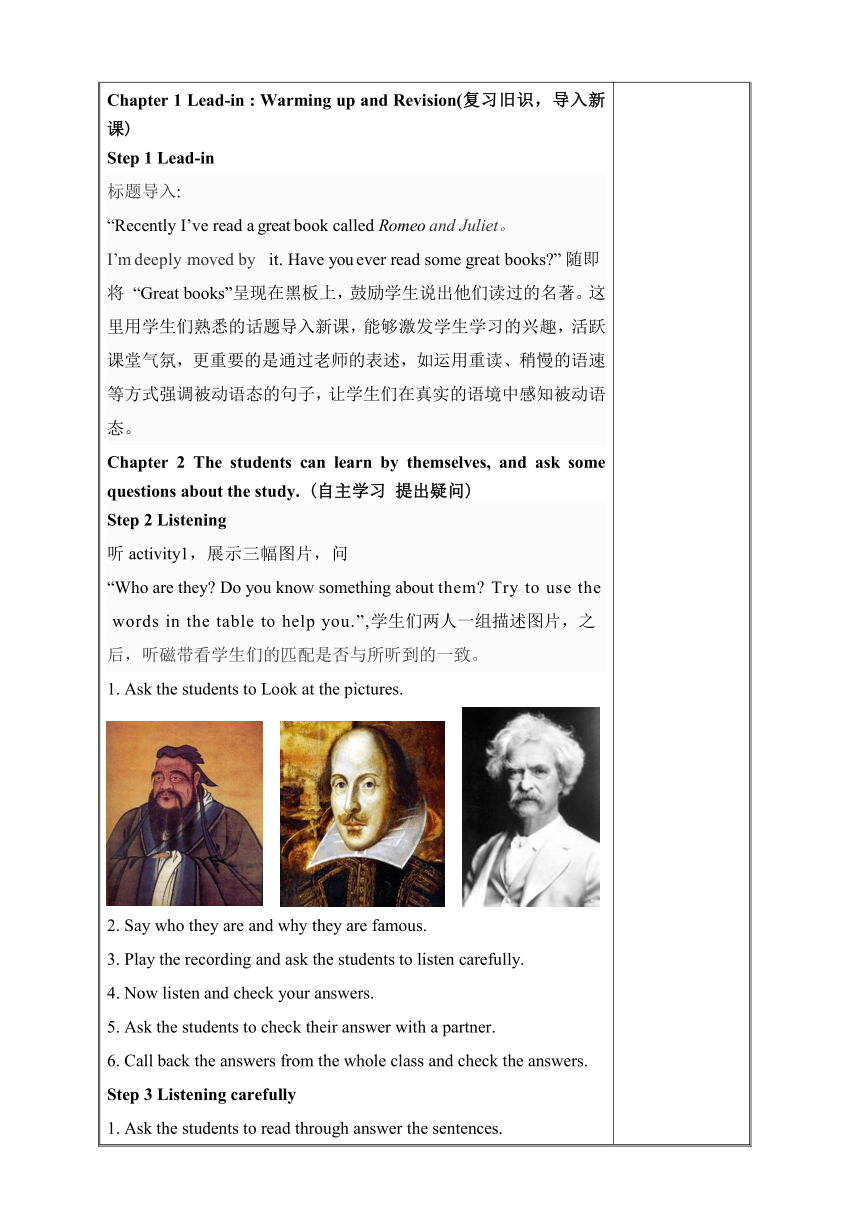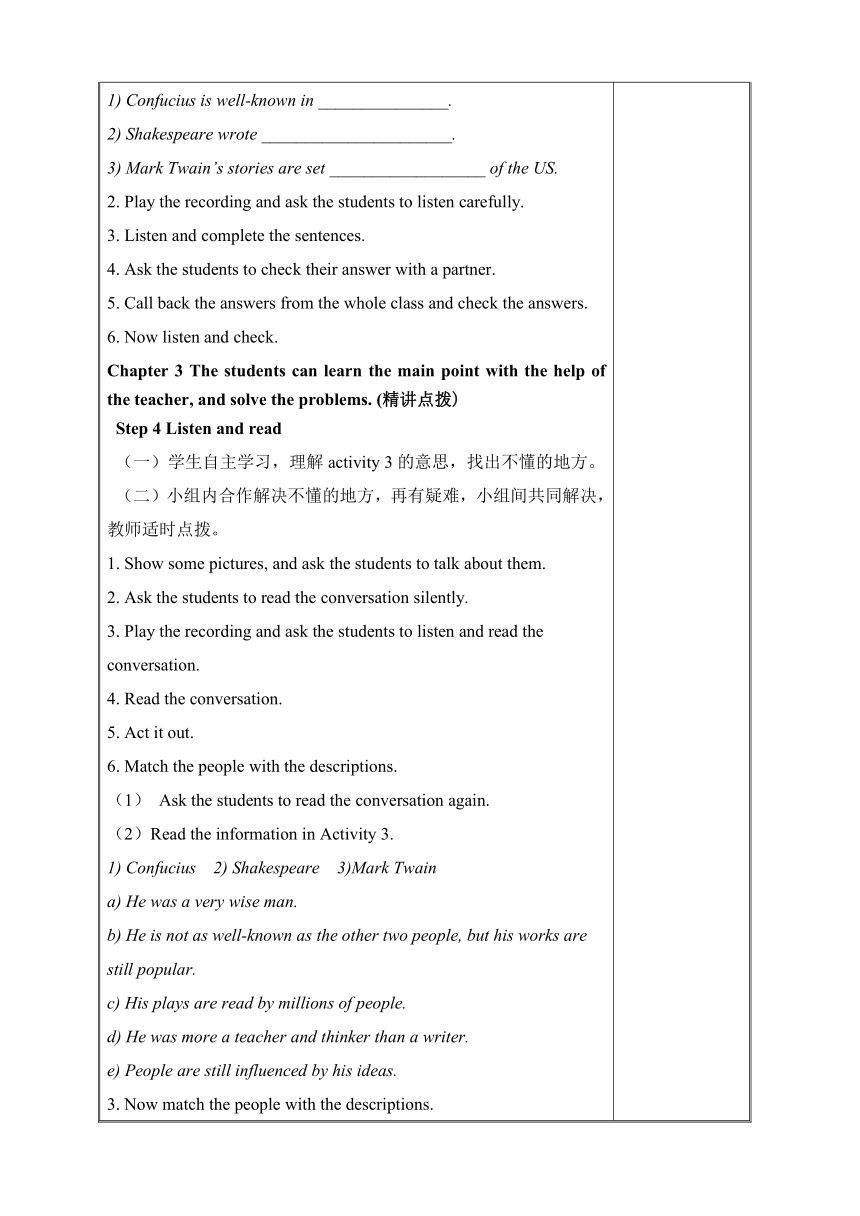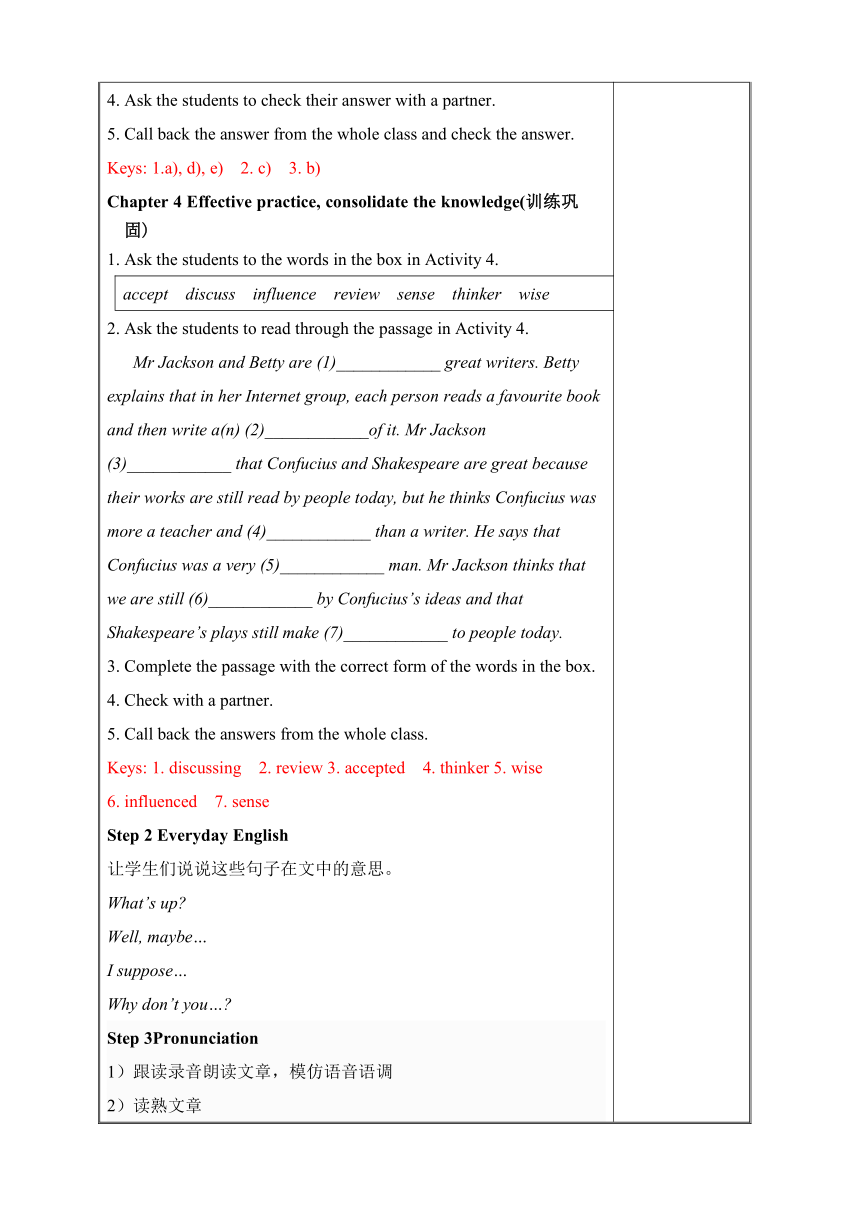Module 7 Great books Unit 1 We’re still influenced by Confucius’s ideas. 教案
文档属性
| 名称 | Module 7 Great books Unit 1 We’re still influenced by Confucius’s ideas. 教案 |  | |
| 格式 | zip | ||
| 文件大小 | 511.6KB | ||
| 资源类型 | 教案 | ||
| 版本资源 | 外研版 | ||
| 科目 | 英语 | ||
| 更新时间 | 2015-10-03 17:33:58 | ||
图片预览




文档简介
课 题
Module 7 Great books
Unit 1 We’re still influenced by Confucius’s ideas.
共 1 课时
主备教师
使用教师
备课日期
上课日期
教材分析
教学目标
1. 知识目标:能正确理解并使用下列单词及短语
I 能正确使用下列单词和短语
discuss, thinker, wise, review, influence, sense, make sense, by the way, suppose, well-known
教学重难点
一般现在时的被动语态的用法
课 型
Listening and speaking
授课方法
pwp
教具准备
多媒体课件,录音机
教与学的设计
我的修改
Chapter 1 Lead-in : Warming up and Revision(复习旧识,导入新课)
Step 1 Lead-in
标题导入:
“Recently?I’ve?read?a?great?book?called?Romeo?and?Juliet。 I’m?deeply?moved?by? it.?Have?you?ever?read?some?great?books?”?随即将 “Great?books”呈现在黑板上,鼓励学生说出他们读过的名著。这里用学生们熟悉的话题导入新课,能够激发学生学习的兴趣,活跃课堂气氛,更重要的是通过老师的表述,如运用重读、稍慢的语速等方式强调被动语态的句子,让学生们在真实的语境中感知被动语态。
Chapter 2 The students can learn by themselves, and ask some questions about the study. (自主学习 提出疑问)
Step 2 Listening
听activity1,展示三幅图片,问“Who?are?they??Do?you?know?something?about?them??Try?to?use?the?words?in?the?table?to?help?you.”,学生们两人一组描述图片,之后,听磁带看学生们的匹配是否与所听到的一致。
1. Ask the students to Look at the pictures.
2. Say who they are and why they are famous.
3. Play the recording and ask the students to listen carefully.
4. Now listen and check your answers.
5. Ask the students to check their answer with a partner.
6. Call back the answers from the whole class and check the answers.
Step 3 Listening carefully
1. Ask the students to read through answer the sentences.
1) Confucius is well-known in _______________.
2) Shakespeare wrote ______________________.
3) Mark Twain’s stories are set __________________ of the US.
2. Play the recording and ask the students to listen carefully.
3. Listen and complete the sentences.
4. Ask the students to check their answer with a partner.
5. Call back the answers from the whole class and check the answers.
6. Now listen and check.
Chapter 3 The students can learn the main point with the help of the teacher, and solve the problems. (精讲点拨)
Step 4 Listen and read
(一)学生自主学习,理解activity 3的意思,找出不懂的地方。
(二)小组内合作解决不懂的地方,再有疑难,小组间共同解决,教师适时点拨。
1. Show some pictures, and ask the students to talk about them.
2. Ask the students to read the conversation silently.
3. Play the recording and ask the students to listen and read the conversation.
4. Read the conversation.
5. Act it out.
6. Match the people with the descriptions.
(1) Ask the students to read the conversation again.
(2)Read the information in Activity 3.
1) Confucius 2) Shakespeare 3)Mark Twain
a) He was a very wise man.
b) He is not as well-known as the other two people, but his works are still popular.
c) His plays are read by millions of people.
d) He was more a teacher and thinker than a writer.
e) People are still influenced by his ideas.
3. Now match the people with the descriptions.
4. Ask the students to check their answer with a partner.
5. Call back the answer from the whole class and check the answer.
Keys: 1.a), d), e) 2. c) 3. b)
Chapter 4 Effective practice, consolidate the knowledge(训练巩固)
1. Ask the students to the words in the box in Activity 4.
accept discuss influence review sense thinker wise
2. Ask the students to read through the passage in Activity 4.
Mr Jackson and Betty are (1)____________ great writers. Betty explains that in her Internet group, each person reads a favourite book and then write a(n) (2)____________of it. Mr Jackson (3)____________ that Confucius and Shakespeare are great because their works are still read by people today, but he thinks Confucius was more a teacher and (4)____________ than a writer. He says that Confucius was a very (5)____________ man. Mr Jackson thinks that we are still (6)____________ by Confucius’s ideas and that Shakespeare’s plays still make (7)____________ to people today.
3. Complete the passage with the correct form of the words in the box.
4. Check with a partner.
5. Call back the answers from the whole class.
Keys: 1. discussing 2. review 3. accepted 4. thinker 5. wise
6. influenced 7. sense
Step 2 Everyday English
让学生们说说这些句子在文中的意思。
What’s up?
Well, maybe…
I suppose…
Why don’t you…?
Step 3Pronunciation
1)跟读录音朗读文章,模仿语音语调
2)读熟文章
?3)画出重读的句子
1. Play the recording once without stopping.
2. Play the recording again and ask the whole class to repeat.
1) We’re still influenced by Confucius’s ideas.
2) Shakespeare’s plays also make a lot of sense to us today.
3) He was important, but I suppose he isn’t as well-known as Confucius or Shakespeare.
3. Ask the students to listen and underline the words the speaker stresses.
4. Now listen again and repeat.
Step 4Group work and speaking
1. Work in groups. Do you agree with the following opinions? Give your reasons.
1) Teahouse is one of the greatest plays in China.
2) Everyone should learn some Tang poems.
3) We should only read books by great writers.
I accept…
I agree / don’t agree with…
I suppose…
I think…
2. Now report the ideas of your group to the whole class.
Most of us think…We think we learn…
3. Work in groups.
Chapter 5 Summary evaluation, leak turnover(总结评价,查漏补缺)
1. What’s up?
What’s up? 是一种非正式的用法,意思是“怎么了/出什么事了?”例如:
What’s up? You look very worried? 怎么了?你看上去很焦虑。
2. But I think I’d describe Confucius more as a teacher and thinker than a writer.
这里的Confucius指孔子,为“孔夫子”的英语译名,是长期以来约定俗成的译法。more…than…在本句中表示“与其说是…不如说是…”。例如:
Success is more hard work than good luck. 成功来自努力,而非好运。
3. … and Shakespeare’s plays also make a lot of sense to us today. …
make sense的意思是“合情理;明智;有意义”。例如:
No wonder how I tried to read it, the sentence still did not make any sense to me. 不管我们怎么努力地读,我还是不懂这个句子的意思。
Why did she do such a thing? It does not seem to make sense. 她为什么做这样的事?似乎没有道理。
4. I want to join an Internet group to discuss great books by great writers.
discuss v.讨论;谈论
discuss的过去分词是discussed, 现在分词是discussing,
discuss sth. (with sb.)和某人谈论某事
e.g. We will discuss the plans with them at the meeting.
我们将和他们在会议上讨论这个计划。
5. We’re still influenced by Confucius’s ideas.
influence v.影响;作用于
influence用作动词时,后面直接跟宾语,常可用于influence sb. to do sth.结构。
e.g. What influenced you to take the job?
什么影响你接受这份工作?
6. By the way, what do you think of Mark Twain, …
by the way用于转入新的话题,意为“顺便说;附带说”。
e.g. By the way, has everybody arrived?
顺便问一句,大家都到了吗?
7. He was important, but I suppose he isn’t as well-known as Confucius or Shakespeare.
suppose v.猜想;推测;相信;认为
后面可以带动词不定式的复合结构或从句,也常用于be supposed to结构。
e.g. I suppose him to be on duty.
我想他在值班。
We are not supposed to smoke here.
我们不应该在这儿吸烟。
well-known adj.众所周知的;著名的
be well-known as意为“作为……而著名”, 相当于be famous as 。
e.g. Norman Bethune was well-known as a great doctor.
白求恩作为一个伟大的医生而著名。
拓展:
be well-known for意为“因为……而著名”,相当于be famous for。除v-ing形式外,for后还可跟名词。
e.g. Yuan Longping is well-known for hybrid rice.
袁隆平因杂交水稻而著名。
8. 小组自我补充
9. 学生自主完成这些重点与难点。
自主完成后,小组合作,交流学习成果,共同释疑。
让学生朗读以上重点知识。
作
业
布
置
完成句子:
1. 我试图让每首歌都体现出它自己的意义。
I try to make each song ____________for itself.
2. 顺便问一下,你认为这个队的水平如何?
_____________, what do you think about this Team?
3. 今天很多人仍然看孔子的作品。
Confucius’ works ______________ by many people today.
4. 学校鼓励学生大声地讲英语。
All the students ______________ speak English loudly.
5. 我们受到孔子思想的影响。
We _____________ by Confucius’s thoughts.
板
书
设
计
Unit 1 We’re still influenced by Confucius’s ideas.
I accept…
I agree / don’t agree with…
I suppose…
I think…
Most of us think…We think we learn…
课
后
反
思
Module 7 Great books
Unit 1 We’re still influenced by Confucius’s ideas.
共 1 课时
主备教师
使用教师
备课日期
上课日期
教材分析
教学目标
1. 知识目标:能正确理解并使用下列单词及短语
I 能正确使用下列单词和短语
discuss, thinker, wise, review, influence, sense, make sense, by the way, suppose, well-known
教学重难点
一般现在时的被动语态的用法
课 型
Listening and speaking
授课方法
pwp
教具准备
多媒体课件,录音机
教与学的设计
我的修改
Chapter 1 Lead-in : Warming up and Revision(复习旧识,导入新课)
Step 1 Lead-in
标题导入:
“Recently?I’ve?read?a?great?book?called?Romeo?and?Juliet。 I’m?deeply?moved?by? it.?Have?you?ever?read?some?great?books?”?随即将 “Great?books”呈现在黑板上,鼓励学生说出他们读过的名著。这里用学生们熟悉的话题导入新课,能够激发学生学习的兴趣,活跃课堂气氛,更重要的是通过老师的表述,如运用重读、稍慢的语速等方式强调被动语态的句子,让学生们在真实的语境中感知被动语态。
Chapter 2 The students can learn by themselves, and ask some questions about the study. (自主学习 提出疑问)
Step 2 Listening
听activity1,展示三幅图片,问“Who?are?they??Do?you?know?something?about?them??Try?to?use?the?words?in?the?table?to?help?you.”,学生们两人一组描述图片,之后,听磁带看学生们的匹配是否与所听到的一致。
1. Ask the students to Look at the pictures.
2. Say who they are and why they are famous.
3. Play the recording and ask the students to listen carefully.
4. Now listen and check your answers.
5. Ask the students to check their answer with a partner.
6. Call back the answers from the whole class and check the answers.
Step 3 Listening carefully
1. Ask the students to read through answer the sentences.
1) Confucius is well-known in _______________.
2) Shakespeare wrote ______________________.
3) Mark Twain’s stories are set __________________ of the US.
2. Play the recording and ask the students to listen carefully.
3. Listen and complete the sentences.
4. Ask the students to check their answer with a partner.
5. Call back the answers from the whole class and check the answers.
6. Now listen and check.
Chapter 3 The students can learn the main point with the help of the teacher, and solve the problems. (精讲点拨)
Step 4 Listen and read
(一)学生自主学习,理解activity 3的意思,找出不懂的地方。
(二)小组内合作解决不懂的地方,再有疑难,小组间共同解决,教师适时点拨。
1. Show some pictures, and ask the students to talk about them.
2. Ask the students to read the conversation silently.
3. Play the recording and ask the students to listen and read the conversation.
4. Read the conversation.
5. Act it out.
6. Match the people with the descriptions.
(1) Ask the students to read the conversation again.
(2)Read the information in Activity 3.
1) Confucius 2) Shakespeare 3)Mark Twain
a) He was a very wise man.
b) He is not as well-known as the other two people, but his works are still popular.
c) His plays are read by millions of people.
d) He was more a teacher and thinker than a writer.
e) People are still influenced by his ideas.
3. Now match the people with the descriptions.
4. Ask the students to check their answer with a partner.
5. Call back the answer from the whole class and check the answer.
Keys: 1.a), d), e) 2. c) 3. b)
Chapter 4 Effective practice, consolidate the knowledge(训练巩固)
1. Ask the students to the words in the box in Activity 4.
accept discuss influence review sense thinker wise
2. Ask the students to read through the passage in Activity 4.
Mr Jackson and Betty are (1)____________ great writers. Betty explains that in her Internet group, each person reads a favourite book and then write a(n) (2)____________of it. Mr Jackson (3)____________ that Confucius and Shakespeare are great because their works are still read by people today, but he thinks Confucius was more a teacher and (4)____________ than a writer. He says that Confucius was a very (5)____________ man. Mr Jackson thinks that we are still (6)____________ by Confucius’s ideas and that Shakespeare’s plays still make (7)____________ to people today.
3. Complete the passage with the correct form of the words in the box.
4. Check with a partner.
5. Call back the answers from the whole class.
Keys: 1. discussing 2. review 3. accepted 4. thinker 5. wise
6. influenced 7. sense
Step 2 Everyday English
让学生们说说这些句子在文中的意思。
What’s up?
Well, maybe…
I suppose…
Why don’t you…?
Step 3Pronunciation
1)跟读录音朗读文章,模仿语音语调
2)读熟文章
?3)画出重读的句子
1. Play the recording once without stopping.
2. Play the recording again and ask the whole class to repeat.
1) We’re still influenced by Confucius’s ideas.
2) Shakespeare’s plays also make a lot of sense to us today.
3) He was important, but I suppose he isn’t as well-known as Confucius or Shakespeare.
3. Ask the students to listen and underline the words the speaker stresses.
4. Now listen again and repeat.
Step 4Group work and speaking
1. Work in groups. Do you agree with the following opinions? Give your reasons.
1) Teahouse is one of the greatest plays in China.
2) Everyone should learn some Tang poems.
3) We should only read books by great writers.
I accept…
I agree / don’t agree with…
I suppose…
I think…
2. Now report the ideas of your group to the whole class.
Most of us think…We think we learn…
3. Work in groups.
Chapter 5 Summary evaluation, leak turnover(总结评价,查漏补缺)
1. What’s up?
What’s up? 是一种非正式的用法,意思是“怎么了/出什么事了?”例如:
What’s up? You look very worried? 怎么了?你看上去很焦虑。
2. But I think I’d describe Confucius more as a teacher and thinker than a writer.
这里的Confucius指孔子,为“孔夫子”的英语译名,是长期以来约定俗成的译法。more…than…在本句中表示“与其说是…不如说是…”。例如:
Success is more hard work than good luck. 成功来自努力,而非好运。
3. … and Shakespeare’s plays also make a lot of sense to us today. …
make sense的意思是“合情理;明智;有意义”。例如:
No wonder how I tried to read it, the sentence still did not make any sense to me. 不管我们怎么努力地读,我还是不懂这个句子的意思。
Why did she do such a thing? It does not seem to make sense. 她为什么做这样的事?似乎没有道理。
4. I want to join an Internet group to discuss great books by great writers.
discuss v.讨论;谈论
discuss的过去分词是discussed, 现在分词是discussing,
discuss sth. (with sb.)和某人谈论某事
e.g. We will discuss the plans with them at the meeting.
我们将和他们在会议上讨论这个计划。
5. We’re still influenced by Confucius’s ideas.
influence v.影响;作用于
influence用作动词时,后面直接跟宾语,常可用于influence sb. to do sth.结构。
e.g. What influenced you to take the job?
什么影响你接受这份工作?
6. By the way, what do you think of Mark Twain, …
by the way用于转入新的话题,意为“顺便说;附带说”。
e.g. By the way, has everybody arrived?
顺便问一句,大家都到了吗?
7. He was important, but I suppose he isn’t as well-known as Confucius or Shakespeare.
suppose v.猜想;推测;相信;认为
后面可以带动词不定式的复合结构或从句,也常用于be supposed to结构。
e.g. I suppose him to be on duty.
我想他在值班。
We are not supposed to smoke here.
我们不应该在这儿吸烟。
well-known adj.众所周知的;著名的
be well-known as意为“作为……而著名”, 相当于be famous as 。
e.g. Norman Bethune was well-known as a great doctor.
白求恩作为一个伟大的医生而著名。
拓展:
be well-known for意为“因为……而著名”,相当于be famous for。除v-ing形式外,for后还可跟名词。
e.g. Yuan Longping is well-known for hybrid rice.
袁隆平因杂交水稻而著名。
8. 小组自我补充
9. 学生自主完成这些重点与难点。
自主完成后,小组合作,交流学习成果,共同释疑。
让学生朗读以上重点知识。
作
业
布
置
完成句子:
1. 我试图让每首歌都体现出它自己的意义。
I try to make each song ____________for itself.
2. 顺便问一下,你认为这个队的水平如何?
_____________, what do you think about this Team?
3. 今天很多人仍然看孔子的作品。
Confucius’ works ______________ by many people today.
4. 学校鼓励学生大声地讲英语。
All the students ______________ speak English loudly.
5. 我们受到孔子思想的影响。
We _____________ by Confucius’s thoughts.
板
书
设
计
Unit 1 We’re still influenced by Confucius’s ideas.
I accept…
I agree / don’t agree with…
I suppose…
I think…
Most of us think…We think we learn…
课
后
反
思
同课章节目录
- Module 1 Wonders of the world
- Unit 1 It's more than 2,000 years old.
- Unit 2 The Grand Canyon was not just big.
- Unit 3 Language in use
- Module 2 Public holidays
- Unit 1 My family always go somewhere interesting a
- Unit 2 We have celebrated the festival since the f
- Unit 3 Language in use
- Module 3 Heroes
- Unit 1 She trained hard,so she became a great play
- Unit 2There were few doctors, so he had to work ve
- Unit 3 Language in use
- Module 4 Home alone
- Unit 1 I can look after myself, although it won’t
- Unit 2 I became so bored with their orders that I
- Unit 3 Language in use
- Module 5 Museums
- Unit 1 Don't cross that rope!
- Unit 2 If you ever go to London, make sure you vis
- Unit 3 Language in use
- Module 6 Problems
- Unit 1 If I start after dinner, I'll finish it be
- Unit 2 If you tell him the truth now, you will sho
- Unit 3 Language in use
- Revision Module A
- Module 7 Great books
- Unit 1 We're still influenced by Confucius's idea
- Unit 2 It is still read and loved.
- Unit 3 Language in use
- Module 8 Sports life
- Unit 1 Daming wasn't chosen for the team last time
- Unit 2 He was invited to competitions around the w
- Unit 3 Language in use
- Module 9 Great inventions
- Unit 1 Will computers be used more than books in t
- Unit 2 Will books be replaced by the Internet?
- Unit 3 Language in use
- Module 10 Australia
- Unit 1 I have some photos that I took in Australia
- Unit 2 The game that they like most is Australian
- Unit 3 Language in use
- Module 11 Photos
- Unit 1 He's the boy who won the photo competition
- Unit 2 The photo which we liked best was taken by
- Unit 3 Language in use
- Module 12 Save our world
- Unit 1 If everyone starts to do something, the wor
- Unit 2 Repeat these three words daily: reduce, reu
- Unit 3 Language in use
- Revision Module B
